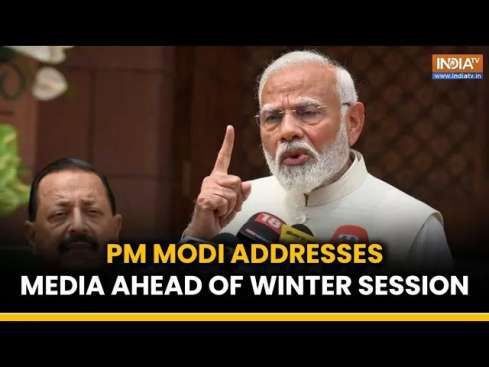 |
|
Prime Minister Narendra Modi's recent statement regarding the upcoming Parliament Winter Session highlights a growing concern about the potential for disruption and disorderly conduct within the legislative body. His characterization of certain actions as "hooliganism by a handful of people" underscores a significant tension between the ruling party and opposition forces. This statement, delivered on November 25th, 2024, sets the stage for what promises to be a contentious session. The use of the term "hooliganism" is particularly strong and suggests a deliberate attempt to frame the anticipated opposition actions in a negative light, emphasizing a lack of decorum and respect for parliamentary processes. This rhetorical strategy serves to preemptively discredit any oppositional maneuvers and potentially garner public support for the government's position.
The context of Modi's remarks is crucial to understanding their impact. The Parliament Winter Session is a significant period in the Indian political calendar, a time when crucial legislation is debated and passed. Disruptions during this session can significantly impede the government's agenda and lead to delays in the implementation of vital policies. Historically, the Indian Parliament has witnessed instances of disruption, ranging from noisy protests to physical altercations. These disruptions often stem from deep-seated political disagreements, ideological differences, and strategic maneuvering by opposition parties seeking to obstruct the government's initiatives. Modi's statement, therefore, can be viewed as a preemptive measure to manage expectations and possibly influence public opinion regarding the upcoming session's potential disruptions.
Analyzing Modi's statement further, the phrase "Some people who have been rejected by the people" suggests an attempt to discredit the opposition by portraying them as lacking popular support. This is a common tactic in political discourse, aiming to undermine the legitimacy of opposition arguments. The implication is that those engaging in disruptive behavior are not representative of the broader population's will. However, the validity of this claim depends on various factors, including the results of recent elections, public opinion polls, and the specific issues driving the opposition's actions. Furthermore, the use of the qualifier "handful of people" seeks to minimize the scale of any potential disruption, suggesting that the issues raised by the opposition are not widespread concerns. This strategy attempts to frame the opposition as a fringe group rather than a significant political force representing a broad segment of society.
The upcoming Parliament Winter Session will undoubtedly be closely watched, both domestically and internationally. The success or failure of the session in terms of passing crucial legislation will have significant implications for India's economic and social development. Modi's statement serves as an early indicator of the government's approach to managing potential disruptions and its strategy for framing the narrative surrounding the session. The coming weeks will reveal whether this approach proves effective in preventing disruptions or whether the session will be characterized by the very "hooliganism" the Prime Minister seeks to condemn. The political fallout from the session will likely shape the narrative leading up to future elections and provide valuable insights into the dynamics of India's political landscape.
Beyond the immediate political context, Modi's statement raises broader questions about the functioning of parliamentary democracy and the role of opposition parties. Healthy political discourse requires robust debate and the ability to hold the government accountable. However, the line between legitimate dissent and disruptive behavior can often be blurry. Finding a balance between allowing for the expression of opposition viewpoints and maintaining the smooth functioning of the legislative process remains a continuous challenge for parliamentary democracies globally. India's experience with parliamentary disruptions reflects this ongoing tension and the need for innovative mechanisms to manage conflict and foster constructive political dialogue. The effectiveness of parliamentary processes hinges on the willingness of all stakeholders, including the ruling party and opposition parties, to engage in good faith and prioritize national interests above partisan political gains.
Source: PM Modi talks about "hooliganism by handful of people" ahead of Parliament Winter Session
